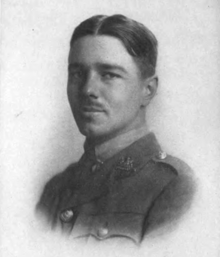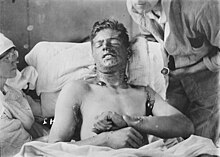Dulce et Decorum est (poem)
Dulce et Decorum est ( Latin for: it is sweet and honorable ) is the title of the most famous poem by the British poet Wilfred Owen , which he wrote at the end of 1917 during the First World War . It describes a gas attack and the resulting painful death of an unknown soldier. The work was only published posthumously in 1920.
history
History of origin
On October 21, 1915, Owen volunteered in the British Army. After several months of training, he was sent to France as an officer in the Manchester regiment to take part in the trench warfare there. Shortly afterwards, Owen had to be sent to the Craiglockhart Hospital near Edinburgh in Scotland for medical treatment for post-traumatic stress disorder . During his stay, he met Siegfried Sassoon , who was also interned there, and Owen was a young British war veteran and poet. Both became friends. Sassoon was already a well-known writer by this time and had a lasting influence on Owen's further development as a poet. In the hospital he introduced him to Robert Graves , among others , who in turn brought Owen into contact with other writers after his stay in Craiglockhart Hospital.
text
Dulce et Decorum est
Bent double, like old beggars under sacks,
Knock-kneed, coughing like hags, we cursed through sludge,
Till on the haunting flares we turned our backs
And towards our distant rest began to trudge.
Men marched asleep. Many had lost their boots
but limped on, blood-shod. All went lame; all blind;
Drunk with fatigue; deaf even to the hoots
Of disappointed shells that dropped behind.
Gas! GAS! Quick, boys! - An ecstasy of fumbling,
fitting the clumsy helmets just in time;
But someone still was yelling out and stumbling
and floundering like a man in fire or lime .--
Dim, through the misty panes and thick green light
As under a green sea, I saw him drowning.
In all my dreams, before my helpless sight,
He plunges at me, guttering, choking, drowning.
If in some smothering dreams you too could pace
Behind the wagon that we flung him in,
And watch the white eyes writhing in his face,
His hanging face, like a devil's sick of sin;
If you could hear, at every jolt, the blood
Come gargling from the froth-corrupted lungs,
Obscene as cancer, bitter as the cud
Of vile, incurable sores on innocent tongues, -
My friend, you would not tell with such high zest
To children ardent for some desperate glory,
The old Lie: Dulce et decorum est
Pro patria mori.
Dulce et Decorum est,
bent twice like old beggars under their sack,
knock-kneed, coughing like old women, we cursed ourselves through the mud,
Until we turned
our backs on the ghostly flares And trudged towards our distant calm.
Men marched in their sleep. Many had lost their boots,
but limped on on bloody soles. Everyone got lame, everyone blind,
drunk with exhaustion, deaf even to the howl of
the failed grenades that hit behind us.
Gas! GAS! Quick guys! - an ecstatic fiddling, in
order to put on the clumsy helmets in time.
But someone was still screaming
and stumbling and wriggling like someone burned by fire or quick lime.
Indistinct, through the steamed-up window and cloudy green light
As in a green sea, I saw him drown.
In all my dreams, before my helpless eyes,
he dives at me, flickering, choking, drowning.
If you too walked in oppressive dreams
Behind the car we threw him into,
And saw the twisted white eyes on his face,
In his drooping face, like that of a devil tired of sin,
If you could hear like at Every thrust the blood
gurgles from his foam-filled lungs,
disgusting like cancer, bitter like ruminating,
Of expectoration, incurable wounds on innocent tongues,
My friend, you did not tell
children who thirsted for a desperate glory,
the old one with such great pleasure Lie: Dulce et decorum est
Pro patria mori.
Form and content
Dulce et Decorum est is considered one of the masterpieces not only of Owens, but of English poems from the time of the First World War as a whole. The title is derived from the line "Dulce et decorum est pro patria mori." ("It is sweet and honorable to die for the fatherland.") By the Roman poet Horace . Not only during the First World War, this line was often instrumentalized for propaganda purposes by various conflicting parties in order to glorify military service itself and dying in war as a heroic act.
With Owen, however, this quote is not meant to be heroic ; he uses it ironically , even sarcastically . In the last line of his poem this becomes clear:
"The old Lie: Dulce et decorum est / Pro patria mori."
"The old lie: Dulce et decorum est / Pro patria mori."
The oldest dated version of the poem is from October 16, 1917 from a letter Owen wrote to his mother. This included the new poem with the note:
"... here is a gas poem, done yesterday, (which is not private, but not final). The famous Latin tag means of course It is sweet and meet to die for one's country. Sweet! And decorous !! "
"... here is a gas poem, written yesterday (which is not private, but not finished yet). The famous Latin headline, of course, means' It is sweet and honorable to die for your country. Sweet! And honorable !! '"
Dulce et Decorum est comprises 28 lines, which are arranged in four stanzas with different numbers of verses (8–6–2–12). Owen describes in his poem how several soldiers, at the end of their physical and psychological strength, stagger through the battle area more than march. Suddenly there is a poison gas attack. In a panic, the men try to put on their gas masks . One does not make it in time and dies in agony before the eyes of the author.
dedication
From Dulce et Decorum est there are four z. Some of the manuscript versions that differed slightly from one another . Two each are now in the British Library and the English Faculty Library at Oxford University . Some of them have a dedication under the title , which was later changed for reasons of the overall impression and finally removed completely. Owen's “dedication”, however, is not in the strict sense, because it is to be understood as an indictment. In manuscript B you can find:
"To Jessie Pope etc."
"For Jessie Pope etc."
Owen himself changed this in Manuscript D to:
"To a certain poetess"
"For a certain poet"
Jessie Pope (1868-1941) was a well-known British writer and journalist who became known during the First World War for poems with hurray-patriotic content, with which she tried to “motivate” young men or put them under moral pressure to volunteer to report for military service. One of her best-known war poems at the time was entitled Who's for the game? (“Who wants to play?” Or “Who wants to be there?”), Others had titles like The Call or Who's for the Trench - Are you, my laddie (“Who wants to go into the trenches - You, my boy?").
In a first version Owen “dedicated” the poem to Pope because he blamed her and her jingoistic , war-glorifying poems for the fact that so many young men died on the front lines. With the last three lines of the poem he addressed Pope "directly", so to speak:
"My friend, you would not tell with such high zest / To children ardent for some desperate glory, / The old Lie: Dulce et decorum est / Pro patria mori."
"My friend, you would not have such a great pleasure / children, greedy for desperate fame / the old lie: Dulce et decorum est / Pro patria mori."
With increasing duration of the war and increasing reports of the horror of the events v. a. in France the influence of war writers such as Owen, Sassoon and others grew. As their popularity rose, so did that of writers like Jessie Pope. Pope is as good as forgotten today.
reception
Wilfred Owen was killed at the age of 25 on November 4, 1918, exactly one week before the end of the war, in fighting on the Canal de la Sambre à l'Oise , near the small French town of Joncourt in the Aisne department . Posthumously he was awarded the Military Cross for bravery before the enemy.
In addition to Rupert Brooke , Isaac Rosenberg , Siegfried Sassoon and Charles Sorley , Owen is considered to be one of the most outstanding representatives of the English war poets , most of whom perished in the First World War. His most important works include Dulce et Decorum est , the poems Anthem for Doomed Youth ("Hymn for a doomed youth"), Insensibility , Futility and Strange Meeting . Some of his words have found their way into common usage , such as B. Dulce et Decorum est as an ironic allusion or [My subject is] War, and the pity of War. ("[My subject is] war and the suffering of war.") And The Poetry is in the pity. ("Poetry is in compassion."). The last two quotations come from Owen's self-written preface to a book of poetry that he wanted to publish in 1919. The English composer Benjamin Britten processed nine poems by Owens in his War Requiem, begun in 1961 and completed in 1962 . On the title page of the score are Owen's words:
"My subject is war, and the pity of war.
The poetry is in the pity ...
All a poet can do today is warn. "
“My topic is war and the suffering of war.
Poetry is in compassion ...
All a poet can do today is to warn. "
literature
- Jon Stallworthy (Ed.): The war poems of Wilfred Owen. Chatto & Windus, London 1994, ISBN 0-7011-6126-4 (Reprinted edition. Ibid 2007, ISBN 978-0-7011-6126-2 ).
- Johannes CS Frank (Ed.): "The wretchedness of war. Collected poems by Wilfred Owen." Publishing house J. Frank, Berlin, 2014, ISBN 978-3-940249-55-5 .
Individual evidence
- ↑ a b The First World War Poetry Digital Archive, background information
- ^ The First World War Poetry Digital Archive
- ↑ Horati Flacci Carminvm Liber Tertivs
- ↑ Original page of the letter ( page no longer available , search in web archives ) Info: The link was automatically marked as defective. Please check the link according to the instructions and then remove this notice.
- ↑ Who's for the game?
- ↑ Notes on Dulce et Decorum Est
- ^ The Guardian: Jessie Pope: the Daily Mail's favorite first world war poet
- ↑ London Gazette: (Supplement) No. 31480, p. 9761 of July 30, 1919 ( page no longer available , search in web archives ) Info: The link was automatically marked as defective. Please check the link according to the instructions and then remove this notice.
- ^ The Guardian: Poets of the First World War
- ^ Owen's foreword
- ↑ www.warrequiem.de ( Memento of the original dated February 14, 2010 in the Internet Archive ) Info: The archive link was inserted automatically and has not yet been checked. Please check the original and archive link according to the instructions and then remove this notice.
- ↑ Was Requiem


